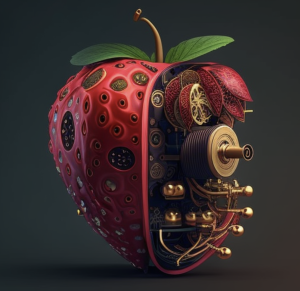One of the things we do badly and get agitated about a lot is the naming of things to do with technology; not least in the realm of digital education. Just ask a room of HE folk for a definition of ‘Blended’ and ‘Hybrid’ and wait for saloon brawl to ensue. So it is with some of the language that is emerging as default in relation to all things ‘Artifical Intelligence’, notably and especially the large language model (LLM) ‘ChatGPT’.
Shorthand
I do understand when folk get antsy when something is called a thing that it isn’t, isn’t exactly or isn’t entirely. But, unless you’re a specialist, a pedant, or willfully awkward (and granted a lot of academics are at least two of these- no offence intended), we may as well get on with saying strawBERRIES, peaNUTS and TIN foil even if they are no such thing. In that vein, I am more than happy to use ‘AI’ as a shorthand for all the stuff that is vexing, perplexing and flexing educators just now. I’m afraid that if someone starts saying: ‘Well technically, it’s not artificial intelligence per se, but rather a fine-tuned large language model…’ I can feel my eyes glazing over. Obviously this stuff is fundamental if you are a computer scientist but the reason such shorthands exist is that they are short, handy (clues are in the word) and suitable for lay users. Experts that know this are one step closer to communicating beyond their discipline.

Eponym
I am much less comfortable with some brand eponyms; especially when the tools and the words to describe them are still evolving. Against my better judgement, I ‘Google’ stuff even if I’m in Safari and I use a ‘hoover’ (even though the only actual- and long discarded- Hoover I ever owned metaphorically ‘sucked’ at the literal thing it was supposed to do). But I am pushing back at the generic use of ‘ChatGPT‘ (OpenAI’s LLM) to refer to the latest iteration of large language models. Chatbots have been around for years and the underpinning technology has evolved rather than suddenly appeared but the genius of the release and the subsequent explosion in use and interest is in the non-techy, almost friendly user interface combined with the now famous fluency and (superfically at least) convicing outputs. The ‘GPT’ part stands for ‘Generative Pre-Trained Transformer’ which certainly needs unpicking to understand but 100 million users in two months is testament to the appeal of this iteration of this particular tool with this particular interface that has led to so many using the ‘ChatGPT’ eponymically. But the ongoing interests in Open AI from Bond villan Elon Musk; the environmental and ethical costs and implications along with the ‘Oh my god ChatGPT could pass an MBA’ educational panic in some quarters mean we could rue generalising the term. Subscriptions to ChatGPT will necessarily change our realtionship with it and, if even half of what reading about Microsoft integrations are to be believed (as well as Google’s “Look at us, we have ‘Bard'”counter-panic) the technology will be no more separate from the tools we use every day than a spellchecker.
My suggestion
All I’m saying really is that we should think carefully about the terms we use now lest they become fossilised, awkward and, worse, provide advertising and subtle condonement to what is just one product amongst many (and with not inconsiderable ethical baggage). So, for my tuppence worth: I think it’s OK for educators and students to use AI as a catch all term for these new dialogic, chat interface tools as well as other generative tools such as Dall-e and Midjourney ‘image from text’ generators and other comparable AIs such as AI music generation and AI video generators. The common denominator is ‘generation’ so I wonder whether we might usefully agree to use ‘AI text generators’, ‘AI image generators’ etc.. . as the default? I have been using ‘language models’, ‘large language models’ and even LLMs and realise that experts would likely prefer this framing but to a lay ear these say nothing about what these tools do and, anyway, when ‘The One Show’ (Popular BBC early evening magazine programme (starts at 22:56) is using ‘ChatGPT’ generically, a technical preference has probably got no chance.
Fully agree about the use of language, particularly those pedants and “AI”. From what I’ve seen, not so many people are using ChatGPT as a catch all, rather they’re so focussed on the one tool, that they’re potentially missing others. But perhaps that’s my interpretation.
While ”text generators” & “image generators” work for now, I can’t help thinking that tools that do both & more will be coming along soon – so, most likely presentationgenerators, then who knows.